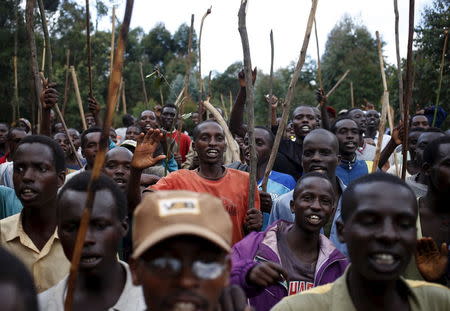Burundi says has delayed elections amid prolonged protests

By Clement Manirabarusha BUJUMBURA (Reuters) - Burundi's electoral body has delayed planned local and parliamentary elections in response to an appeal from African leaders, the head of the election body said on Wednesday, after more than a month of protests against the president's bid for a third term. President Pierre Nkurunziza's decision to seek a third mandate has plunged the nation into its worst crisis since an ethnically charged civil war ended in 2005. The protesters say his move violates the constitution, which sets a two-term limit. The almost daily protests erupted on April 26 and activists say more than 30 people have been killed so far, making the timetable that envisages a parliamentary vote on Friday and a June 26 presidential poll appear increasingly untenable. With no sign of an end to the unrest, African leaders meeting at a summit in Tanzania called for a delay in the election timetable of at least a month and a half. Western donors and opposition parties have also urged a postponement. "The June 5 local and parliamentary elections are postponed until another date that is unknown. The authorised persons will announce it in hours, in days ahead," electoral body CENI president Pierre Claver Ndayicariye said in a broadcast on state television. Ndayicariye made no mention of presidential elections. Nkurunziza has previously defended his decision to run again by citing a constitutional court ruling saying he can do so, but the government has also said it is open to the idea of postponing the poll schedule. The violence in Burundi has unnerved a region with a history of ethnic conflict. Burundi has the same ethnic mix of majority Hutus and a Tutsi minority as Rwanda, where a 1994 genocide killed 800,000 people, mostly Tutsis and moderate Hutus. CALM The commission, whose decisions are signed off by the president, had already delayed the parliamentary and local council elections to Friday, a little more than a week later than originally planned. Those votes could now be shifted back further, along with the June 26 presidential vote and July 17 senate election. Witnesses said the streets of the capital Bujumbura were relatively calm. A small group of protesters gathered in Butarere and Ngagare, two of the city's flashpoint districts, but other areas were generally quiet. Separately, a group of 17 opposition parties that had broken off U.N. and African Union-led talks meant to break the political stalemate said they would resume them, but Nkurunziza's term appeared reluctant. “We can’t go into elections with Nkurunziza; it would be against constitution,” Charles Nditije, speaking on behalf of the parties, said. Nditije said they had also called for peaceful protests to run until Nkurunziza withdraws from seeking a third term.
